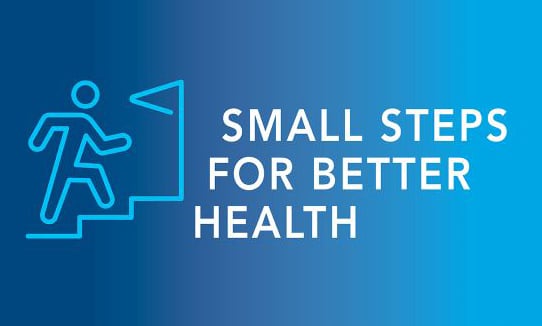



Summary
A relaxing nighttime routine can help you get better sleep and improve your overall health. Follow these tips to create your own routine for good sleep.
Subscribe to our podcast to follow along with Small Steps for Better Health.
Sleep is important to help our bodies rest. High-quality sleep improves mental function, physical health and emotional well-being. It also helps our heart, our metabolism, our hormone balance and our immune system.
As important as sleep is, it isn’t always easy to get the recommended 7-9 hours of sleep each night.
This week, work on creating a relaxing nighttime routine that signals to your body that it’s time to rest and helps you wind down.
A nighttime routine doesn’t have to be complicated or lengthy. Try some different things until you find something that works for you. Here are some ideas to get you started:
- Try a few minutes of quiet meditation or gentle stretches.
- Dim your lights and avoid screens for as much time as you can before bed.
- Try a cup of hot (decaffeinated) tea to sip on as you relax.
- Make sure your bedroom is quiet and relaxing. You might want to try an eye mask, blackout curtains, a white noise machine or earplugs to create a peaceful environment.
- Try to have a regular sleep schedule. Lie down to sleep at the same time each night and wake up at the same time (even on weekends and holidays).
- Use your bed for sleep. Don’t watch TV, work on your laptop, pay bills or scroll on your phone.
- Avoid heavy meals too close to bedtime.
- Avoid alcohol and nicotine. Alcohol decreases the quality of your sleep.
Good sleep can improve many aspects of your health. For the next two weeks, prioritize finding a simple evening routine that works for you and helps you to relax and sleep peacefully.
If you are still having trouble sleeping, talk to your doctor for further evaluation. Medical conditions like sleep apnea, restless leg syndrome, narcolepsy or depression can cause poor sleep. Medications for sleep may lead to dependence or have adverse side effects, so discuss with your doctor if sleep medication is right for you.
Small Steps, Better Health
Every two weeks we will introduce another Small Step for Better Health. Follow us on social media for more tips, and sign up for our email newsletter, True North.


Lakeisha Chism, MD
Lakeisha Chism, MD, is a family physician at Verona Medical Clinic. She is board certified by the American Board of Family Medicine. A native of Memphis, Tennessee, Dr. Chism received a bachelor’s degree in biology from the University of Memphis. She received her medical training from Meharry College in Nashville, Tennessee, and completed her residency at North Mississippi Medical Center Family Medicine Residency Program in Tupelo.

Subscribe to Our Newsletter
Like this content and want to get more? Sign up for True North, the health and wellness newsletter from North Mississippi Health Services!

Subscribe to Our Newsletter
Like this content and want to get more? Sign up for True North, the health and wellness newsletter from North Mississippi Health Services!

Nurse Link®
Call 1-800-882-6274 anytime to speak directly to a registered nurse and get immediate answers. Using computerized medical protocols, nurses direct callers to the most appropriate medical treatment. Our nurses are available 24 hours per day, seven days per week.



